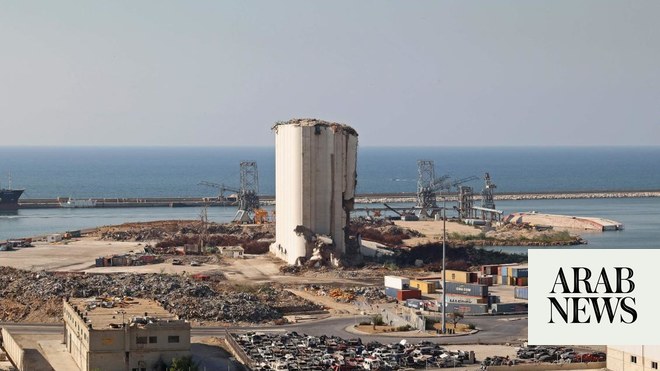
Facts of the blast bogged down in legal and political wrangling
BEIRUT: One of history’s biggest non-nuclear explosions rocked Beirut on August 4, 2020, destroying swathes of the Lebanese capital, killing more than 220 people and injuring at least 6,500.
Three years on, the probe into the traumatic disaster caused by a huge pile of poorly-stored fertilizer remains bogged down in legal and political wrangling, to the dismay of victims’ families.
The massive explosion, heard as far away as Cyprus, destroyed much of Beirut port and entire districts of the city in scenes that shook the country and the world.
The blast left a 43-meter (141 foot) deep crater and registered as the equivalent of a magnitude 3.3 earthquake.
The disaster spread fear and chaos, with mountains of broken glass littering roads and bloodied survivors flooding overwhelmed hospitals.
The blast was caused by a fire in a warehouse where a vast stockpile of the industrial chemical ammonium nitrate had been haphazardly stored for years.
The tragedy struck amid a deep economic crisis, almost a year after mass demonstrations erupted against a ruling class deemed inept and corrupt as living conditions worsen.
Here’s a timeline of events following the Beirut blast:
On August 10, 2020, Prime Minister Hassan Diab resigns under a barrage of pressure over the explosion.
In December 2020, the lead investigator examining the blast, Fadi Sawan, charges Diab and three ex-ministers with negligence.
Two of them file a complaint, the probe is suspended, and Sawan is removed from his post by court order.
In July 2021, the new investigating magistrate, Tarek Bitar, moves to interrogate four former ministers but parliament stalls on lifting their immunity.
He is forced to suspend the probe following a series of court challenges.
In October 2021, the powerful Shiite movement Hezbollah and its ally Amal call for demonstrations to demand Bitar’s dismissal.
Seven people are killed in gunbattles during the rally.
At the end of 2021, Bitar resumes his investigation but less than two weeks later is forced to suspend work for a fourth time following more legal challenges.
On August 4, 2022, several grain silos damaged in the explosion collapse in a cloud of dust, a traumatic reminder of the disaster that struck exactly two years before.
Days earlier, other parts of the silos crumbled after a fire broke out when remaining grain stocks fermented and ignited in the summer heat.
In January 2023, 13 months after his probe is suspended, Bitar resumes work and charges Prosecutor General Ghassan Oueidat and seven others with probable intent to murder, arson and other crimes.
Oueidat in turn charges Bitar with insubordination and “usurping power” but the investigator refuses to step down.
Oueidat also orders the release “of all those detained” over the port blast, leaving the investigation stalled and nobody yet held to account.
Victims’ families and rights groups urge the United Nations to create an independent fact-finding mission.












